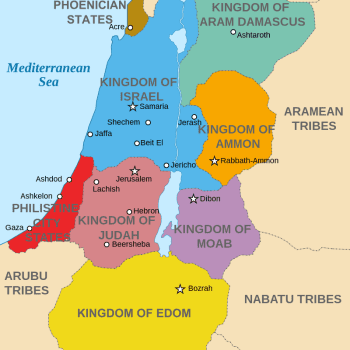As modern people, we often find it hard to believe that ancient people lived as they did. And in the case of some practices, like human sacrifice, we may suspect that reports are exaggerated. In a discussion in a comment thread, this subject came up. Ezekiel 20:25-26 seems to suggest that child sacrifice in Israel was once not only common but required by law. Of course, laws which simply say that every firstborn male is to be offered to God are now tempered by laws allowing a price to be paid instead of sacrificing a human child, or which treat the Levites as consecrated to God and thus an offering in place of the firstborn of the rest of Israel. But these seem like they could be later attempts to reinterpret a law that required firstborn males to be sacrificed. I would love to hear the perspective of those who work primarily in the domain of Hebrew Bible or ancient Levantine archaeology, to hear your thoughts on this aspect of ancient Israel.
Last week in my Sunday school class, we reached Hebrews 11, and spent a significant amount of time talking about the story of Abraham trying to offer Isaac. That story has been coming up a lot. And it is a disturbing story, as it should be from our perspective. Even if it is an attempt to combat child sacrifice, by presenting God as not really wanting it, it still doesn't challenge the possibility of God asking for such a sacrifice, even if it suggests that God wouldn't make someone go through with it.
A major question that came up in the comments on the other post is whether child sacrifice could really once gave been common. My own view is that people in ancient times felt themselves to be at the mercy of dangerous forces upon which their fragile lives depended. Any action however radical that could placate those forces and get them to act favorably towards humans would seem worth it. The existence of the practice in other societies even in our time might substantiate this.
Today we know that nature is not a person and natural forces cannot be bargained with. If nature is not merely a dead object we can abuse, neither is it a god or a pantheon. Thinking of nature as like anotherl iving thing, to be domesticated by humans when possible, but still treated with kindness and care, is perhaps the best analogy.
Science eliminates the felt need to sacrifice one's children in the hope of bringing rain or fertility or averting pestilence and famine. Now if only we could stop sacrificing children on the altar of convenience, self-interest, and profit, we would be making even more substantial progress.
Science can radically revolutionize our understanding, but it doesn't eliminate the need for prophetic voices to challenge our moral assumptions.














